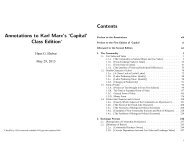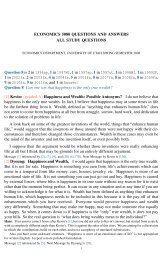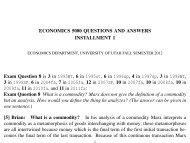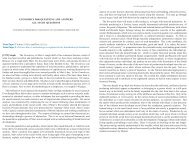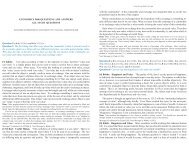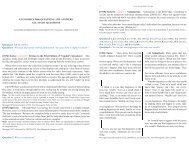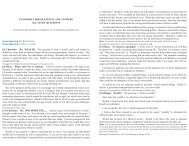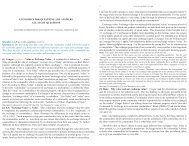Question 1 What did Marx mean with his formu - University of Utah
Question 1 What did Marx mean with his formu - University of Utah
Question 1 What did Marx mean with his formu - University of Utah
Create successful ePaper yourself
Turn your PDF publications into a flip-book with our unique Google optimized e-Paper software.
U <strong>of</strong> <strong>Utah</strong> Econ 5080 2007fa 51<br />
assembly line worker, time is consistent. An assembly line worker may experience more<br />
discomfort and make more moves than the teacher, but does t<strong>his</strong> <strong>mean</strong> they are producing<br />
more? No, indeed it is simply the type <strong>of</strong> work which they are doing.<br />
According to <strong>Marx</strong>, “labor is what determines the value <strong>of</strong> a product.” The higher amount<br />
<strong>of</strong> labor time put into a commodity the higher the value will be. So, if a certain commodity is<br />
produced <strong>with</strong> more discomfort by one laborer that another but in the same amount <strong>of</strong> time,<br />
it should not have twice as much value but the same value because it took the two the same<br />
amount <strong>of</strong> time to produce it.<br />
Hans: <strong>Marx</strong> does not argue that labor should be measured using time, but he argues that the labor which creates<br />
value is measured by time. Please re-read my [65]. Capital is not a blueprint for a better society!<br />
Your in-class answer <strong>did</strong> not make t<strong>his</strong> error but it talked about wages. There is a difference between the value<br />
produced by a worker and the wages received by a worker. See my [29], [45], [49].<br />
Message [197] referenced by [288] and [341]. Next Message by Karly is [198].<br />
[217] Melanie: graded B <strong>Marx</strong> uses labor-time to measure labor because labor-time is the<br />
only thing all the different kinds <strong>of</strong> labor have in common. It would be difficult to measure<br />
labor using something such as “drops <strong>of</strong> sweat <strong>of</strong> the laborer”. In fact, some types <strong>of</strong> labor<br />
may not involve sweat at all. The only measurable similarity found in all types <strong>of</strong> labor is,<br />
thus, labor-time.<br />
Hans [2002fa:25] quoted <strong>Marx</strong> who wrote in Contribution, 271:2/o: “variations in the<br />
duration <strong>of</strong> labor are the only possible difference that can occur if the quality <strong>of</strong> labor is<br />
assumed to be given.”<br />
Hans: Your first few words “<strong>Marx</strong> uses labor-time to measure labor” start you on the wrong foot. <strong>Marx</strong> does not<br />
decide how to best measure labor, but he is trying to find out how in a commodity society the quantity <strong>of</strong> value is<br />
determined. His theory says that the labor that makes up value is measured by labor-time. The question asked you<br />
to explain why it is labor-time and not some other measurement <strong>of</strong> labor.<br />
Message [217] referenced by [252] and [626]. Next Message by Melanie is [218].<br />
[229] Kalmerico: Measuring Exploitation. Labor is measured by labor time because<br />
it is the one thing that all workers have in common, which in turn allows markets to set<br />
all products equal. Measuring labor by drops <strong>of</strong> sweat would not necessarily be the most<br />
accurate strategy because the differing physical make-up <strong>of</strong> each worker could cause some<br />
to sweat pr<strong>of</strong>usely and others not at all. The same type <strong>of</strong> idea could be applied in regards to<br />
a laborer’s discomfort. However, time is an unfortunate way to measure one’s labor because<br />
it forces workers to be speedy and all alike in their production, which completely ruins<br />
any chance <strong>of</strong> creativity or innovation occurring. It seems unlikely that someone randomly<br />
decided to measure labor by time, but more likely that it is a spontaneous act <strong>of</strong> the market<br />
and is the cause <strong>of</strong> much exploitation.<br />
Hans: In the light <strong>of</strong> your last sentence t<strong>his</strong> measuring should not be called a “strategy.”<br />
Next Message by Kalmerico is [230].<br />
[236] Harmon: Drops <strong>of</strong> sweat! Labor is measured in labor-time because it gives the<br />
commodity its third value – the labor-value, or how much <strong>of</strong> a certain commodity is produced<br />
in a given amount <strong>of</strong> time. If the value was measured by drops <strong>of</strong> sweat or amount <strong>of</strong><br />
discomfort the exchange rate would change, making it more pr<strong>of</strong>itable for the laborer and<br />
higher priced for the buyer. Laborers must take pride in the commodities they are producing<br />
and turn out a good product, but it is more pr<strong>of</strong>itable for the owner <strong>of</strong> the company to employ<br />
laborers who turn out large amounts <strong>of</strong> good products in short amounts <strong>of</strong> time. Thus, the<br />
52 2007fa Econ 5080 U <strong>of</strong> <strong>Utah</strong><br />
value <strong>of</strong> commodities (in t<strong>his</strong> case) is measured by the amount <strong>of</strong> time it takes the laborer to<br />
turn out that commodity, not <strong>his</strong>/her amount <strong>of</strong> sweat or discomfort.<br />
Hans: We are not talking about it how the laborer gets paid, but how the market determines the quantity <strong>of</strong> value<br />
<strong>of</strong> a commodity.<br />
Next Message by Harmon is [363].<br />
[252] Desk: Time being a critical factor. Time is the critical factor when <strong>Marx</strong> wishes to<br />
discuss labor and labor value. Labor cannot be measured by the drops <strong>of</strong> sweat <strong>of</strong> a person<br />
nor <strong>his</strong> discomfort because <strong>of</strong> time. I wish to use several examples showing the importance<br />
<strong>of</strong> time. Time is something that everyone can relate to, no matter the situation no one can<br />
avoid how time is essential in one’s life. <strong>Marx</strong> states that the measure <strong>of</strong> the value <strong>of</strong> things is<br />
the duration <strong>of</strong> the labor on the average requisite, performed <strong>with</strong> the average amount <strong>of</strong> skill<br />
and diligence, and in the normal industrial conditions at any given time. In t<strong>his</strong> example we<br />
will use the construction <strong>of</strong> a house. The builder pays the laborer for <strong>his</strong> labor-power at its<br />
value, that is to say, by giving him the amount <strong>of</strong> money which, representing six hours labor,<br />
permits him to build the house at a specific need; but as he thus obtains the free disposal<br />
<strong>of</strong> t<strong>his</strong> productive force for which he has paid, he acquires everything it produces during<br />
the entire day. He will never pay the worker on the drops <strong>of</strong> sweat or the discomfort <strong>of</strong> the<br />
worker for that reason. The employer has different methods <strong>of</strong> increasing <strong>his</strong> pr<strong>of</strong>its. The<br />
first consists in multiplying the number <strong>of</strong> <strong>his</strong> workmen. The second method is to lengthen<br />
the working day. The longer the laborer works beyond the necessary time which represents<br />
<strong>his</strong> wages, the greater the pr<strong>of</strong>it he would have.<br />
Hans: Your first sentence “time is the critical factor when <strong>Marx</strong> wishes to discuss labor and labor value” or your<br />
fourth sentence “time is something that everyone can relate to” start you on the wrong foot. It is not <strong>Marx</strong>’s decision<br />
or the employer’s decision to measure labor by time. Please look at my comment to [217] and my [65]. Some <strong>of</strong><br />
what you write seems to indicate that you are aware <strong>of</strong> t<strong>his</strong>, other things are in contradiction <strong>with</strong> it.<br />
Next Message by Desk is [254].<br />
<strong>Question</strong> 90 is 57 in 1997WI, 57 in 1997sp, 63 in 1999SP, 65 in 2001fa, 66 in 2002fa, 68<br />
in 2003fa, 78 in 2004fa, 77 in 2005fa, 90 in 2007SP, 92 in 2008SP, 90 in 2008fa, 93 in<br />
2009fa, 97 in 2010fa, and 117 in 2011fa:<br />
<strong>Question</strong> 90 Is it a character flaw to be lazy in an exploitive system?<br />
[56] AJoseph: graded A weight 50% The Workers’ Slow Down. It depends on the<br />
circumstances. One where it would not be, <strong>Marx</strong>’s quote in 129:2 alludes to an ideological<br />
basis for the classic Workers’ Slow Down, where pretend laziness can help workers get a<br />
larger share <strong>of</strong> the pr<strong>of</strong>it for the work that they do.<br />
One may also think <strong>of</strong> chattel slaves injuring themselves or breaking tools on purpose, or<br />
conscripted soldiers shooting themselves in the foot on the way to a battle at t<strong>his</strong> point.<br />
Hans: You started on the right foot, but much more can be said here. Perhaps those who are truly lazy are also<br />
protesting, but in a self-punitive way? Perhaps they are opposed to capitalism but then blame themselves for it<br />
rather than the system, just like the many gay people who are homophobic at the same time?<br />
AJoseph: Thank you, yes, I suppose I took the examples to the extreme. Shortly after posting t<strong>his</strong> regretted not<br />
having read <strong>Marx</strong>’s son in law’s “The Right to Be Lazy,” to be able to cite it for more perspective a moderate form<br />
<strong>of</strong> laziness.<br />
Next Message by AJoseph is [686].<br />
[60] ZACH: Lazy in an exploitive system? To paraphrase <strong>Marx</strong> on page 129:2, it might<br />
seem that the lazier the worker the more the commodity would cost because it would take



